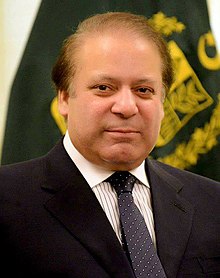King of corruptions arrested PAKISTAN
this two person looted Pakistan like an enemy
this two person cheated his army and public and eat all money and then Pakistan become a poor country because of this two corrupted politician
External Debt in Pakistan increased to 106312 USD Million in the second quarter of 2019 from 105841 USD Million in the first quarter of 2019. External Debt in Pakistan averaged 57771.30 USD Million from 2002 until 2019, reaching an all time high of 106312 USD Million in the second quarter of 2019 and a record low of 33172 USD Million in the third quarter of 2004.
1.NAWAZ SHARIF:

Mian Muhammad Nawaz Sharif (Urdu: میاں محمد نواز شریف, born 25 December 1949) is a Pakistani businessman and politician who served as the prime minister of Pakistan for three non-consecutive terms. Sharif is the longest-serving prime minister of Pakistan.
Born into the upper-middle class Sharif family in Lahore, Sharif is the son of Muhammad Sharif, the founder of Ittefaq and Sharif Group. He is the elder brother of Shehbaz Sharif, who also served as the chief minister of Punjab. According to the Election Commission of Pakistan, Sharif is the one of the wealthiest men in Pakistan, with an estimated net worth of at least 1.6 billion Pakistani rupees. Most of Sharif's wealth originates from his businesses in steel construction.
Before entering politics in the 1970s, Sharif studied business at Government College and law at the University of Punjab. In 1981, Sharif was appointed by President Zia as the minister of finance for the province of Punjab. Backed by a loose coalition of conservatives, Sharif was elected as the Chief Minister of Punjab in 1985 and re-elected after the end of martial law in 1988. In 1990, Sharif led the conservative Islamic Democratic Alliance and became the 12th prime minister of Pakistan.
After being ousted in 1993, when president Ghulam Ishaq Khan dissolved the National Assembly, Sharif served as the leader of the opposition to the government of Benazir Bhutto from 1993 to 1996. He returned to premiership after the Pakistan Muslim League (N) (PML-N) was elected in 1997, and served until his removal in 1999 by military takeover. After prison and exile for more than a decade, he returned to politics in 2011 and led his party to victory for a third time in 2013.
In 2017, Sharif was removed from office by the Supreme Court of Pakistan regarding revelations from the Panama Papers case.[2][3][4][5] In 2018, the Pakistani Supreme Court disqualified Sharif from holding public office,[6][7] and he was sentenced to ten years in prison.[8]
2.ASIF ALI ZARDARI:

Asif Ali Zardari (Urdu: آصف علی زرداری; Sindhi: آصف علي زرداري; born 26 July 1955)[4] is a Pakistani politician and the former co-chairperson of Pakistan People's Party. He served as the 11th President of Pakistan from 2008 to 2013, the first president born after Partition. He is member of National Assembly of Pakistan since August 2018.
The son of Hakim Ali Zardari, a landowner from Sindh, Zardari rose to prominence after his marriage to Benazir Bhutto in 1987, who became the Prime Minister of Pakistan after her election in 1988. When Bhutto's government was dismissed by President Ghulam Ishaq Khan in 1990, Zardari was widely criticized for involvement in corruption scandals that led to its collapse.[5][6] When Bhutto was reelected in 1993, Zardari served as Federal Investment Minister and Chairperson of Pakistan Environmental Protection Council. Following increasing tensions between Bhutto's brother Murtaza and Zardari, Murtaza was killed in a police encounter in Karachi on 20 September 1996.[7][8] Bhutto's government was dismissed a month later by President Farooq Leghari, while Zardari was arrested and indicted for Murtaza's murder as well as corruption charges.[9][10]
Although incarcerated, he nominally served in Parliament after being elected to the National Assembly in 1990 and Senate in 1997. He was released from jail in 2004 and went into self-exile to Dubai, but returned when Bhutto was assassinated on 27 December 2007. As the new Co-Chairman of the PPP, he led his party to victory in the 2008 general elections. He spearheaded a coalition that forced military ruler Pervez Musharraf to resign, and was elected President on 6 September 2008. He was acquitted of various criminal charges the same year.[11][7]
As president, Zardari remained a strong American ally in the war in Afghanistan, despite prevalent public disapproval of the United States following the Raymond Davis incident and the Nato attack in Salala in 2011. Domestically, Zardari achieved the passage of the Eighteenth Amendment in 2010, which constitutionally reduced his presidential powers. His attempt to prevent the reinstatement of Supreme Court judges failed in the face of massive protests led by his political rival Nawaz Sharif. The restored Supreme Court dismissed the PPP's elected Prime Minister Yousaf Raza Gillani for contempt in 2012, after Gillani refused to write to the Government of Switzerland to reopen corruption cases against Zardari. Zardari's tenure was also criticised for mishandling nationwide floods in 2010, and growing terrorist violence. Following multiple bombings of Hazaras in Quetta in early 2013, Zardari dismissed his provincial government in Balochistan.
Towards the end of his term, Zardari recorded abysmally low approval ratings, ranging from 11 to 14%.[12][13] After the PPP was heavily defeated in the 2013 general election, Zardari became the country's first elected president to complete his constitutional term on 9 September 2013.[14] His legacy remains divisive, with political observers accusing his administration of corruption and cronyism.[15][16]

No comments:
Post a Comment